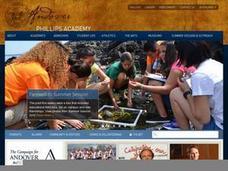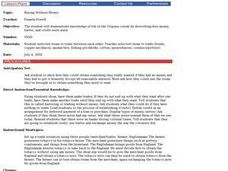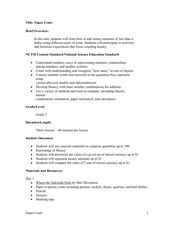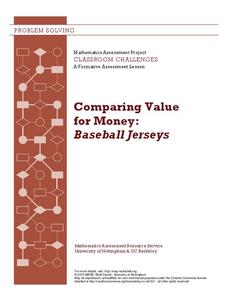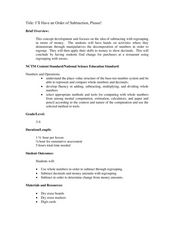Curated OER
Money Madness
Second graders review coins and their values. In this coin recognition lesson, 2nd graders review the coin values as they read 'Smart' by Shel Silverstein. Students use class computer demonstrations to identify the coin's names, worth,...
Curated OER
Problem Solving in British Pounds
Compare the cost of four common food items at the grocery store! The value of these objects is represented in British pounds, but you could cross this off if it's too confusing for your elementary learners.
Curated OER
Money, Banks, & Financial Institutions
Students engage in a study of financial institutions that includes the banking industry. They participate in a research study using different resources. They are introduced to the concept of bartering and how it is used as a replacement...
Curated OER
The Euro: Money Changes Everything
High schoolers begin the lesson by being introduced to the currency of the Euro. As a class, they must decide which is worth more, the euro or a United States dollar. Using the internet, they determine the current exchange rate and...
Curated OER
Buying Without Money
Students describe life in the Virginia colony. They explain how money, barter, and credit were used. Students simulate trading items among classmates. Students compare/contrast credit and trade.
EngageNY
Why Do Banks Pay YOU to Provide Their Services?
How does a bank make money? That is the question at the based of a lesson plan that explores the methods banks use to calculate interest. Groups compare the linear simple interest pattern with the exponential compound interest pattern.
Advocates for Human Rights
Human Rights Defined
Class members continue their investigation of the factors that influence migration with a lesson on human rights. As they examine the Universal Declaration of Human Rights and selected US Constitutional Amendments, learners compare the...
Howard County Schools
To Babysit or Not to Babysit?
Would you work for a penny today? Use this activity to highlight the pattern of increase in an exponential function. Scholars compare two options of being paid: one linear and one exponential. Depending on the number of days worked, they...
Curated OER
A Lifetime of Savings
Sometimes people who seem to lead what would be considered an ordinary life do extraordinary things. Such was the case with Oseola McCarty, who donated a large sum of money for a university scholarship fund in her name. Oseala lived her...
Elementary AMC
Earth Day Math
Take some time this Earth Day to nourish the growth of your young mathematicians with this series of task cards. Whether it's the four basic operations, place value, money, or elapsed time, these conservation-themed problems will engage...
Curated OER
Money Makes the World Go 'Round
Students examine what a basic unit of currency means and how it affects world finances.
Curated OER
Saving Makes Cents
Students identify ways families save money. In this financial lesson, students read the book A Chair for My Mother and discuss ways to save money. Students identify coin values and practice counting money.
Curated OER
Super Cents
Second graders study money amounts less than a dollar. In this math lesson, 2nd graders practice counting coins. Students read various stories and discuss how money was used in the stories.
Curated OER
A Trip to the Toy Store
First graders recognize and identify the value of a penny, nickel and dime. They spend play money in a simulated toy store and match their coins to the purchase price of a toy of their choice.
Curated OER
Comparing Value for Money: Baseball Jerseys
Learners step up to the plate as they first complete an assessment task using linear equations to determine the best company from which to buy baseball jerseys. They then evaluate provided sample responses identifying strengths and...
Curated OER
What Shape Is Money? Money Doesn't Have to Be Round or Rectangular
Students explain that many kinds of objects have been used as money. After identifying qualities that make a good currency, they design a nontraditional currency and decide on its value.
Curated OER
Coin Content
Students calculate ancient Greek coin values as compared to their weight, equivalence in grain, and determine their worth today. They explain how to calculate fractions of a given weight and how to use decimal numbers.
Curated OER
Made Round To Go Round
In this lesson young scholars investigate what it would cost to furnish one room of their choice by shopping on the Internet. Both Australian and American dollars are to be given for each item to demonstrate the difference between two...
Curated OER
One Vs. One Hundred
Students explore the concept of place value. They differentiate between digits and their values as it related to addition and subtraction. Through the use of technology and manipulatives students investigate the place value of digits by...
Curated OER
How Rich Is Rich?
Second graders read "Alexander, Who Used to Be Rich, Last Sunday" by Judith Viorst. They watch a video of the book and identify and record amounts of money mentioned in the story. They investigate money-related websites.
Curated OER
I'll Have an Order of Subtraction Please!
Students explore number values by completing consumer math worksheets. In this math functions lesson, students identify the use of a decimal in numbers and the place values that are represented when dealing with money. Students complete...
Curated OER
Sides of a Texas Quarter
Students study the meaning, symbolism, and value of U.S. coins, especially the quarter. They research Texas symbols online and create a design for the obverse and reverse sides a Texas quarter in a choice of media.
Curated OER
Same and Different
For this mathematics activity, students first complete the tens place and then add the rest. Then they continue the patterns and compare each column. Students also fill in the missing addends and solve various word problems by writing a...




